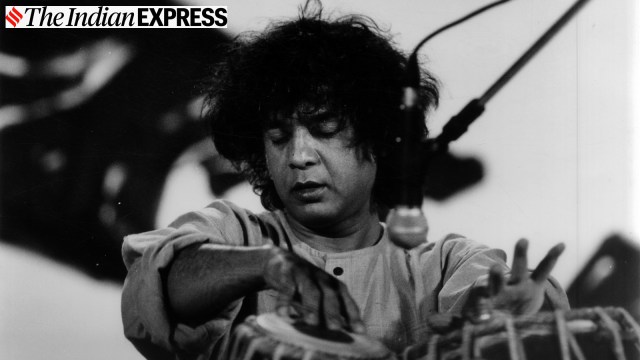📣 For more lifestyle news, click here to join our WhatsApp Channel and also follow us on Instagram
Tracing Ustad Zakir Hussain’s journey from a prodigy to global maestro
From his earliest years, Zakir Hussain was immersed himself into the tabla.
 Throughout the 1970s and 1980s, Hussain became a pioneering force in world music. (Source: Express Archives)
Throughout the 1970s and 1980s, Hussain became a pioneering force in world music. (Source: Express Archives)The nation mourns the loss of Ustad Zakir Hussain, a revolutionary tabla virtuoso who redefined percussion and bridged musical cultures across the globe. Born on March 9, 1951, in Mumbai, Hussain was the son of tabla legend Ustad Alla Rakha Khan, a lineage that would profoundly shape the course of Indian classical music.
A musical journey unfolds
From his earliest years, Hussain immersed himself in the tabla. Under the rigorous tutelage of his father, he began learning the intricate art of percussion at an astonishingly young age. By the time he was a teenager, Hussain was already recognised as a prodigy, displaying a musical maturity far exceeding his years.
The 1960s marked the beginning of his professional journey. Young Hussain started performing alongside his father, quickly establishing himself as a formidable tabla player. His breakthrough came in the early 1970s when he began collaborating with international musicians, which would dramatically expand the global understanding of Indian classical percussion.
Throughout the 1970s and 1980s, Hussain became a pioneering force in world music. He formed groundbreaking collaborations with musicians like jazz guitarist John McLaughlin, creating the revolutionary Shakti ensemble that blended Indian classical music with jazz and world music influences. Beyond Shakti, he worked with an incredible array of musicians, including Yo-Yo Ma in the Silk Road Ensemble, Mickey Hart of the Grateful Dead, and countless classical and jazz musicians. These partnerships broke down musical barriers and introduced audiences worldwide to the art of tabla.
Honours and achievements
His extraordinary contributions did not go unrecognised. The percussionist received the Padma Shri in 1988, Padma Bhushan in 2002, and the Padma Vibhushan in 2023. He was the recipient of four Grammy awards in his career. In 1999, he received the United States National Endowment for the Arts National Heritage Fellowship, a testament to his global impact.
 Even in his later years, Hussain continued to perform, teach, and inspire. (Source: Express Archives)
Even in his later years, Hussain continued to perform, teach, and inspire. (Source: Express Archives)
Artistic philosophy and global impact
Hussain was more than a musician; he was a musical philosopher who saw rhythm as a universal language. “Music is not about nationality or borders,” he often said. “It’s about human connection.” His approach to tabla was revolutionary — he viewed the instrument not as a mere percussion tool but as a living, breathing entity capable of profound communication.
His collaborations were legendary. Beyond Shakti, he worked with an incredible array of musicians, including Yo-Yo Ma in the Silk Road Ensemble, Mickey Hart of the Grateful Dead, and countless classical and jazz musicians. Each collaboration was a testament to his belief that music transcends cultural boundaries.
A lasting legacy
Even in his later years, Hussain continued to perform, teach, and inspire. He was a dedicated guru, passing on his knowledge to younger generations through workshops, lectures, and masterclasses worldwide. His brother Fazal Qureshi and other disciples continue to carry forward his musical legacy.
Some of Hussain’s most memorable quotes defining his artistic essence
On being introduced to the tabla early on
“I was brought home and handed over to my dad in his arms. The tradition was that the father is supposed to recite a prayer in the baby’s ear, welcoming the baby and putting some good words. So he takes me in his arms, puts his lips to my ear, and recites the tabla rhythms into my ears. My mother was livid.”
The importance of building a relationship with the instrument
“You need to have a relationship with the instrument because you want it to do your bidding. It has to accept you and show you that it is ready to take that leap of faith with you.” (Source: scroll.in)
On his love for tea
“I am addicted to music and I supplement that by having some tea because I can’t always be listening to music. But tea has a good music since I was a young kid. I don’t drink, I don’t smoke. No alcohol, no cigarettes, no paan, nothing,”
A tribute to his craft
“I enjoy myself. I really have a great time, because I feel that mujhe jahan hona chahiye mein wahan hoon (I am at a place where I have to be).” (Source: Lehren)
Zakir Hussain leaves behind a musical legacy that transformed how the world understands rhythm, collaboration, and musical expression. His passing marks the end of an era, but the rhythms he created will continue to resonate across generations.
📣 For more lifestyle news, click here to join our WhatsApp Channel and also follow us on Instagram



- 01
- 02
- 03
- 04
- 05
























